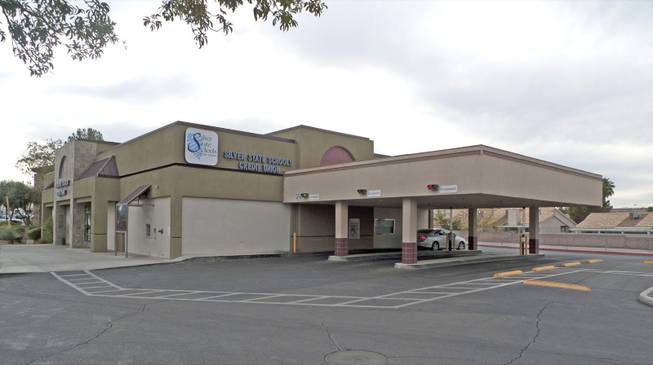
A view of the Stephanie branch of Silver State Schools Credit Union, whose deposits are guaranteed by American Share Insurance.
Friday, Nov. 27, 2009 | 3 a.m.
Five local credit unions privately insure their members’ deposits: Clark County, Cumorah, Boulder Dam, Plus and Silver State Schools.
Three of the 10 largest credit unions insured by American Share are based in the Las Vegas area, the largest being Silver State Schools, according to Nevada Financial Institutions Commissioner George Burns. Clark County is the third largest and Boulder Dam is the eighth largest, he said.
Silver State Schools Credit Union had a troubled-asset ratio of 73.4 percent as of June, according to BankTracker, an Investigative Reporting Workshop and American University project. The national median ratio was 5.8 percent.
Troubled assets are loans that are 90 days or more overdue and properties that have been foreclosed upon by the financial institution.
Silver State’s troubled-asset ratio increased from March’s 66 percent ratio to June’s 73.4 percent despite having more assets because its capital decreased, said Wendell Cochran, senior editor of BankTracker. BankTracker compiles data from financial reports that credit unions file with the National Credit Union Administration. From those reports, it compares a credit union’s troubled assets to its capital and loan-loss reserves.
American Share Insurance CEO Dennis Adams said despite Silver State’s high number of problem loans, it has a good depositor base and strong management.
“There is solid management in place to turn this ship around,” he said. “I don’t picture Silver State a failure.”
But if one of the largest credit unions the company insures, such as Silver State, were to fail, Adams said American Share would seek a merger of the credit union with another credit union. That credit union, which could be in or out of state, could be insured by the federal government, he said. If there were no buyers for the whole credit union, increasingly the case, the credit union would be sold in parts.
Breaking up credit unions is more expensive, Adams said.
Silver State Schools’ President Dave Rhamy did not return a call seeking comment.
Clark County Credit Union had a troubled-asset ratio of 34.7 percent, according to BankTracker. Plus Credit Union’s ratio was 13 percent.
Cumorah Credit Union, which failed in October, had a troubled-asset ratio of 69.6 percent. Adams said because of a confidentiality agreement he could not say whether the insurance fund incurred any losses.
“(Cumorah) had its problems,” he said, adding that the seizure and merger with Credit Union 1 “did not harm our fund.”
The credit union was heavy in commercial construction lending and within a year went from a solvent credit union to a failure, he said.
American Share is a nonprofit corporation that is owned by the 155 credit unions in nine states that it insures.
Credit unions insured by the fund pay 1 percent of their deposits to American Share, which invests that money in short-term federal securities to increase its fund. The fund isn’t invested in risky derivatives or mortgage-backed securities, Adams said.
For instance, if a credit union has $100 million in deposits, it pays American Share $1 million.
If American Share has to absorb a number of failures, the remaining credit unions have to recapitalize it based on their share in the insurance company. Adams said in the company’s 35 years, it has never had to recapitalize the fund.
American Share is frequently reviewed by regulators in Ohio, its home state, and regulators in the eight other states where it insures credit unions. In turn, the company keeps a close eye on the credit unions it insures, Adams said.
“We monitor our institutions very carefully,” he said. “We manage our fund very responsibly.”
Adams is confident that the credit unions it insures, whose depositors are largely government workers, police, firefighters and teachers, gives it an upper hand.
Burns said American Share is highly regulated in Ohio by the state’s insurance and financial institutions departments.
But if the insurance company and one of its credit unions fails, which Burns said is unlikely, another receiver would be named and the assets would be liquidated to pay depositors.
Nevada has no reasonable doubt of American Share’s inability to remain solvent, he said.
Burns said the financial institutions division will work to help any institution survive, regardless if it’s the state’s largest bank or the smallest credit union.
If a credit union is in danger, Burns and his team will work with the insurer to stem its failure, and if failure is imminent, they work with the credit union’s management to find a buyer to avoid liquidation.
That was the case when the state shut down Cumorah Credit Union and sold it to Illinois-based Credit Union 1, both covered by the insurance company.
“The financial institution division takes extraordinary measures to ensure none of our credit unions fails, regardless of size,” Burns said. “Every credit union is important.”
But some are so insolvent the only options are to seize and liquidate or sell to an outside institution.
Of the nine state-chartered credit unions, all but two are insured by American Share Insurance. Five of its insured credit unions are in Las Vegas. The other two are in Northern Nevada.
If other credit unions in Nevada have “federal” in their name, such as Nevada Federal Credit Union, they are insured by the National Credit Union Administration, which is backed by the federal government.
The federal agency has had its share of troubles, shutting down Ensign Federal Credit Union on Nov. 13 and selling it to Texas-based EDS Federal Credit Union, which is in the process of changing its name to InTouch Federal Credit Union.
Disclosure: The reporter is a member of Silver State Schools Credit Union.


Join the Discussion:
Check this out for a full explanation of our conversion to the LiveFyre commenting system and instructions on how to sign up for an account.
Full comments policy